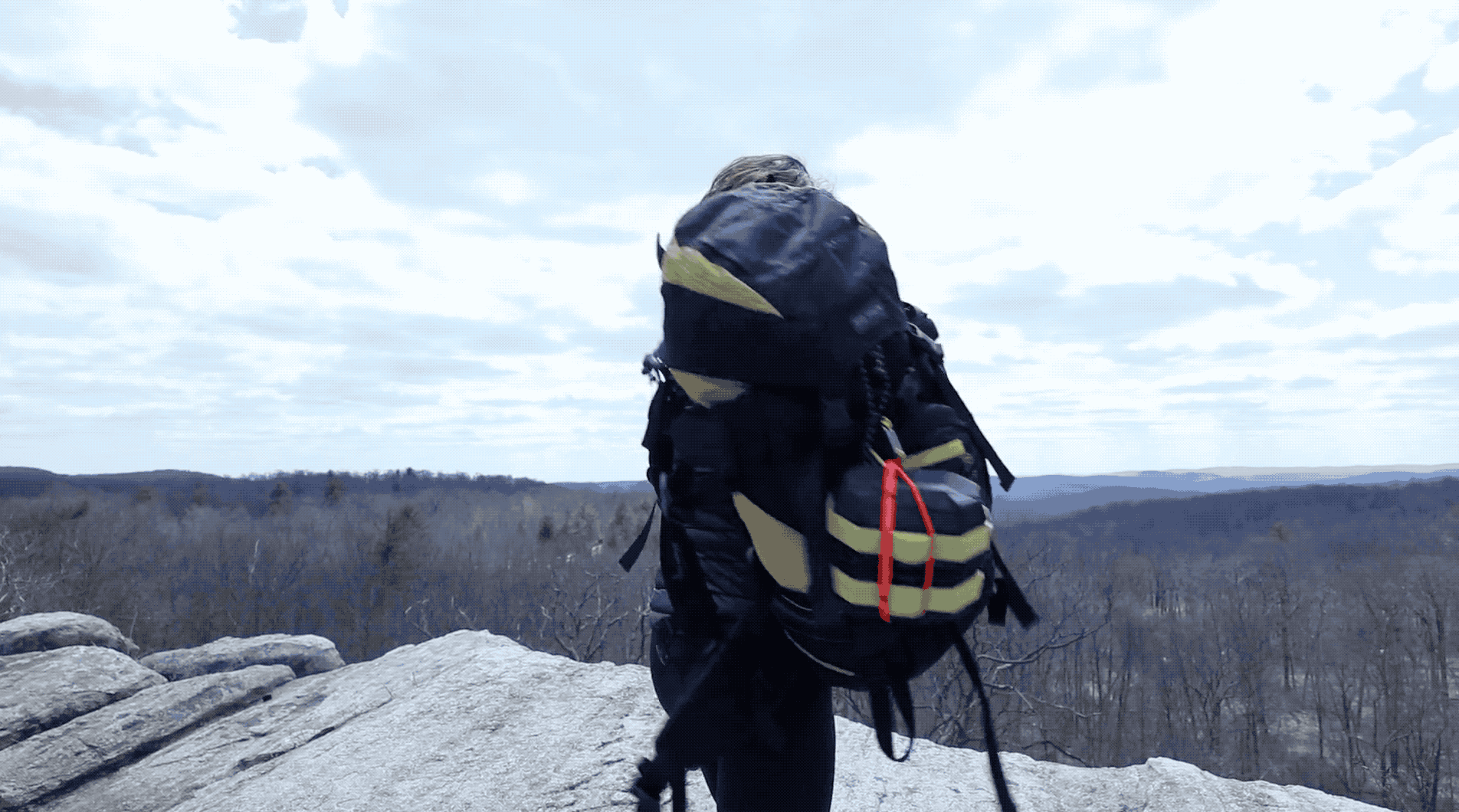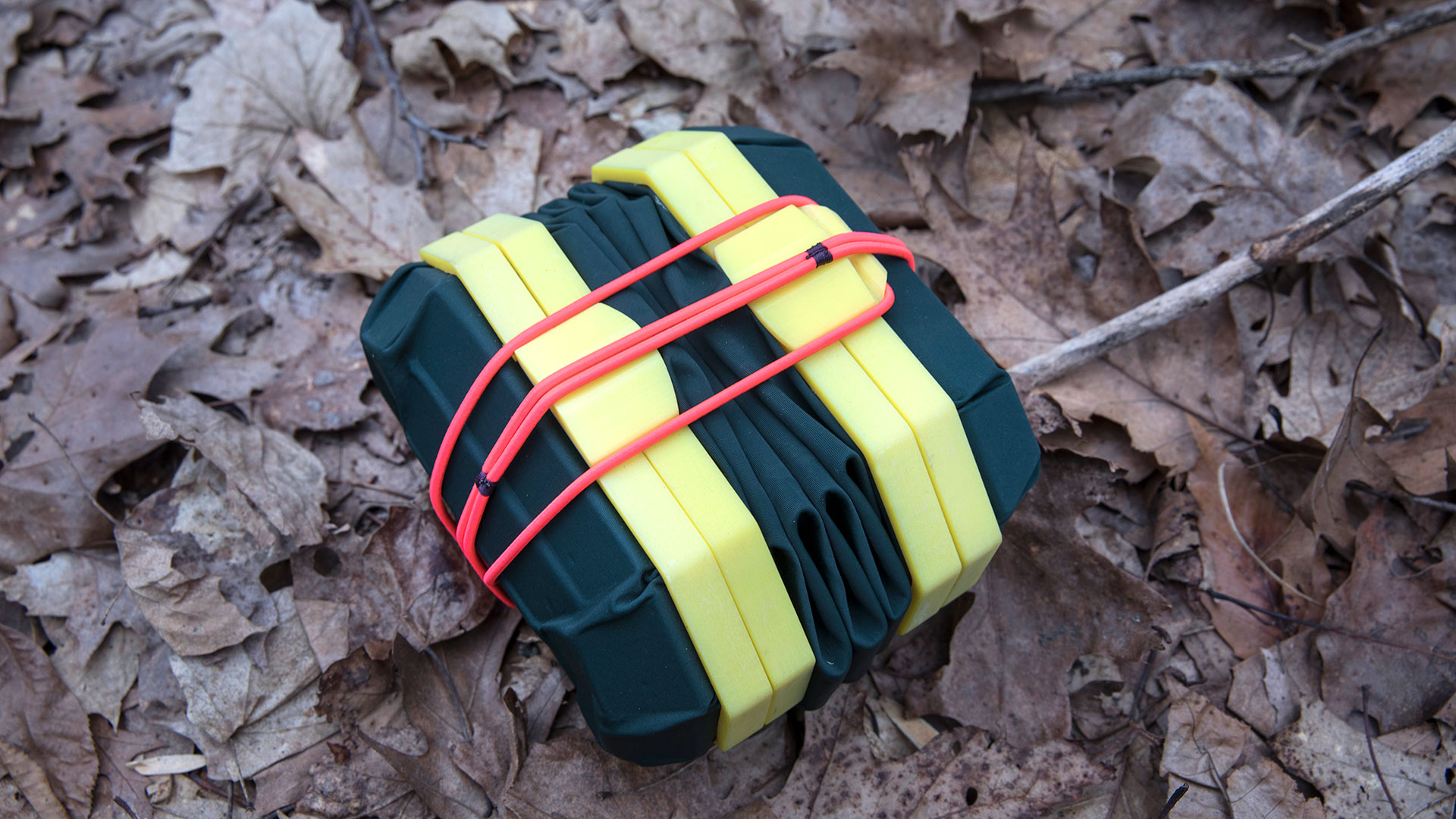
Student Projects
Products, Mobile Apps, Platforms, Thesis Work, and Design Thinking.
Attend our Zoom Info Session on December 11th!
〰️
Attend our Zoom Info Session on December 11th! 〰️
Featured Projects
Latest Projects
The Solar Sleeve: Power on the Go
First year Katy Yuelapwan created the The Solar Sleeve featuring a top layer with solar cells embedded amongst the curvilinear surface, with a bottom layer with silicone straps, and a button that connects both layers. The button allows the product to conserve energy and for the two parts to nestle into each other when they are not in use. It allows the user to use stored up energy as they are walking through a desert wasteland in 2052. The challenges of this project were fitting functionality within the form that was distinguishable as an iteration. The successes of this project lied within utilizing Keyshot to implement Katy’s vision with materiality in mind.
Narrateam: Open-Sourcing Intersectional Feminist Resources
First-year, Margarita Zulueta created Narrateam, a platform that offers a centralized database for intersectional feminists to provide their own narratives and learn from the narratives of others, in order to gain a better understanding of the movement. Narrateam members can use the platform to share resources, events, and news items that are relevant to the movement and connect with like-minded individuals and organizations.
Steam Mouse Iron
For 3DPD1, first-year Qiting Fang created the Steam Mouse iron. She initially looked at the form of curvilinear and planar volumes before function was given to the product. Qiting worked through many iterations and landed on this wonderful redesign of a widely used home good.
Fruiting Bodies: Fungal Futures for Collaborative Survival
Helen Chen’s thesis, Fruiting Bodies: Fungal Futures for Collaborative Survival, explores how new material ecologies and interspecies consciousness—the acknowledgment that we live in complex ecosystems involving both human and non-human life—can create a paradigm shift in current industrial modes of production and consumption. In order to address the urgency of landfill and chemical waste streams around the world, she began her thesis exploration with prototyping biomaterials ranging from bacterial cellulose to algae-based bioplastics and mycelium.
FireLink: Fighting Fire with Data
Theodore Scoufis developed FireLink, an information management ecosystem for firefighters that focuses on the 4 minutes and 30 seconds between receiving the call from dispatch and arrival on the scene. The purpose of the system is to provide firefighters with real-time insight into the conditions of the building they are responding to. Theodore explains that information gathered by FireLink allows firefighters to make more effective decisions more efficiently, which will reduce the threat to civilians, firefighters, and property. FireLink is a bifurcated system of data collection and information dissemination. Data is collected via the data standpipe and disseminated in two main modes: the Command Center tablet application and the helmet-mounted augmented reality heads up display (AR HUD).
PACE: New Modalities for Slow Living in Accelerating Times
Having lived in two of the world’s busiest cities, Beijing and New York City, Sherry Wu developed an interest in the ever-quickening pace of contemporary life. But as the world has undergone a dramatic acceleration, there is also a counter-movement to embrace the concept of slow living. Sherry’s thesis, PACE: New Modalities for Slow Living in Accelerating Times, explores the tension between fast and slow modes of living. She identifies the balance between the two modes as a critical area of focus and views this balance based on the relationship between technology and culture.
A Proposed Redesign of the Promenade at Brooklyn Bridge
The Promenade at Brooklyn Bridge is a proposed redesign of the existing bridge walkway, created by first-year student Regena Reyes. Developed for an international design competition hosted by the Van Allen Institute, the project aims to enhance the visitor experience while addressing the challenges of public infrastructure. Regena's proposed design features additional curved walkways composed of eco-friendly materials to provide more space for visitors to take in the spectacular views from one of New York City's most beloved icons. At the same time, her proposal intends to alleviate congestion on the pathway, creating a more fluid traversal for cyclists and runners.
Launchathon-x: Solving Global Issues Through the Power of Collaborative Design
Launchathon-x invites creatives from all industries to take part in a series of virtual hackathons to solve real-time social, economic, and health problems. Born from the necessity to maintain creative collaboration during the global COVID-19 pandemic, first-year student Danna Krouham was inspired to create the website when she was unable to continue working with her classmates in the Products of Design studio.
Athena: Holding the Art World Accountable
Athena is a platform that creates a space for underrepresented (POC, women, non-binary, and queer) artists to come together to develop a community and voice for equality in the arts. Designed by first-year student Virginia Gordon, the project speaks directly to the revelation that museums globally are failing to demonstrate equitability in their collections, exhibitions, and acquisitions.
Lempup Handmade: Supporting China's Leprosy Villagers
Lempup Handmade is a service platform that aims to provide a self-sustainable economy for quarantined residents of China's leprosy villages. Designed by first-year student Wen Xie, the project is also intended as an anti-discrimination campaign.
Isolated and stigmatized, many residents living in these remote villages are skilled Miao/Yi craftspeople specializing in traditional silverwork, handmade embroidery, and dyed textiles. Wen created an app that would help the villagers share their craftwork—as well as their personal experiences—with the outside world.
37° Lab: Recording and Preserving Flavors from Home
37° Lab is a food memory database platform that records and preserves "chewing memories," bringing comfort to people who are living far from home by bridging the distance through sensory experiences. "Just one sip of miso soup brings me back to my grandma's couch," says first-year student and creator Baoqi Ding. "For me, food is an effective trigger of deeper memories containing feelings and emotions." The experience of living far away from home led Baoqi to explore how geographical structures define us and how we relate to them—prompting her to invent 37° Lab.
Cookspace: Food with Dignity
Cookspace is a membership-based program that provides grocery stores and communal cooking spaces for the homeless and food insecure population within the New York City metro area. Designed by first-year student Regena Reyes, the platform is powered by fresh foods that would otherwise be discarded by local grocery stores and fast-casual restaurants. Cookspace takes these discarded resources and turns them into an opportunity where overlooked communities can purchase, cook, and enjoy nourishing meals.
CARA: A Menstrual Product and Waste Carrier for Multi-Day Trips Outdoors
CARA is a menstrual product and waste carrier designed for use in multi-day trips outdoors. Designed by recent grad Alexia Cohen as part of her thesis, DARE + DEFY: A Woman’s Place in the Great Outdoors, CARA—from the word carapace, meaning the shell of a turtle—features an expandable waste collection container at the center, with two separate dry enclosures at the top and bottom to keep unused menstrual products, toilet paper, and/or wipes clean and ready to use.
WHEN NO ONE BELIEVES YOU: Redesigning the Rape Kit and Responses to Sexual Assault
Antya Waegemann’s thesis, When No One Believes You: Redesigning the Rape Kit and Responses to Sexual Assault, proposes six different design interventions for sexual assault victims, nurses and the police, to increase report rates, improve the experience of getting a rape kit, and increase rape kit testing, as well as to reduce stigma and shame around sexual assault and increase accountability.
GLARE: Urban Longboard Skateboard with Safety "Uplight"
Glare is a longboard skateboard brand designed for the urban commuter. The core technology is the Uplight—a long-wavelength beam of light projected upward onto the rider which increases nighttime visibility and thereby reduces the risk of collision with cars. Designed by second-year students Qixuan Wang, Eugenia Ramos, Micah Lynn, and André Orta, the project brief was “to identify a subculture, design a product to suit a need or opportunity within that community, and then finally design a brand around that product.”
UPGRADE: Designing for Access and Acceptability around Limb Loss and Limb Difference
The historical mindset towards people with physical disabilities has been one of pity and exclusion. While the notion of pity and exclusion is looked down upon in liberal societies, an understanding of what constitutes the objectification of people with disabilities, as well as a greater effort towards inclusion, is still not widespread. The voices of people with limb loss and limb differences (LL/D) are not part of an extensive ongoing conversation about their rights, needs and wants. Through her thesis Upgrade, Adya aims to create the conditions that lead to more open conversations about and with people with LL/D and their acceptance in society, as well as easier access to products and services that improve their quality of life.
GUMMY BUGS: Nutritious, Sustainable and Delicious Candy
Gummy Bugs is a delicious fruity treat made with real bugs. Students Jiani Lin, Juho Li and Louis Elwood-Leach created these edible treats as a way to get highly sustainable and nutritious foods into children’s regular diets.
The Water Token Project: A Cryptocurrency Basic Income Proposal
The Water Token Project is a cryptocurrency basic income program designed to create a more equitable distribution of water. Outlined as a policy proposal for the state of California—a notoriously problematic and overextended watershed—the Water Token Project would use an array of machine learning algorithms to constantly recalculate the gallon-value of a water token on a monthly basis and sustainably distribute these tokens to corporations and citizens alike.
POWER SUITS: Building Confidence in Children with Mental Health Conditions
For a long time, when Doug Fertig heard people talking about wanting to live a healthier life, he perceived a problem: the conversation would focus on building better habits around diet and exercise. Through personal experience and research, however, Doug knew that this was only part of the solution. Taking into consideration the fact that one in four people will suffer from a mental health issue in their life, he argues, "'making healthier choices' are not choices that are simply healthier for our body, but rather also healthier for our mind."

























